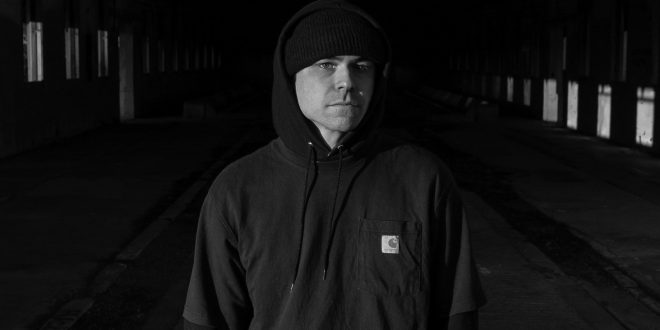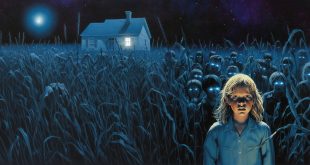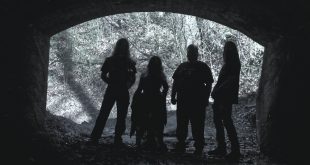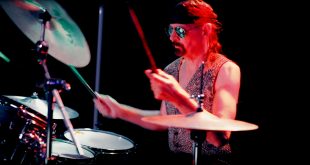Last Friday, Los Angeles musician/producer Andrew Kutner released A Future of Meaningless Tomorrows, his latest EP under the moniker AFTERMYFALL. Kutner’s presentation of influences, while rooted in punk, has broadened to encompass alternative rock, metalcore and electronic music, and is as balanced as it is distinctive.
Following up my review of the EP, I caught up with Kutner to discuss the development of his craft, the EP’s thematic focus on his struggles with anxiety and depression, as well as what he’s gleaned thus far in his career.
When you were growing up, how did your musical environment help shape your musicianship?
Where I grew up, it’s a very rural, small-town area – pretty much the niche of there being not much to do, which leads to an expanding imagination. I’d say that kind of area definitely helped me a lot creatively. Back in the 80s, my father was a sound engineer for the entirety of the punk scene – bands like Black Flag and Dead Kennedys.
Legends!
Yeah, these legendary bands! Growing up, I’d hear a bunch of stories about his time on the road with these bands, and that inspired me to learn a lot about music and become a big fan of the creative process.
I’m sure that hearing those stories compelled you to ask him more questions and really gather what the scene was all about.
Oh yeah, 100 percent. He’s got plenty of tour stories. There’s a legendary punk band from Los Angeles called X, and my dad is still really good friends with them to this day. One of my earliest concerts I went to was an X show. I got to go backstage, meet the band, and all this stuff.
It’s funny. I remember talking to one of the members around that time, saying, “Hey, I wanna get into music; do you have any advice?” All he said to me was “Turn back while you still can” (laughs)! I didn’t understand that until much later, but yeah, we’re along for the ride.
How did your approach to music evolve over time?
My progression with music was pretty eventful. I started in a metalcore band, and kept going with them for four years. That was my introduction to writing songs, playing shows, and doing that whole thing, during the golden age of metalcore. After that, I had gotten out of it, just because it was a huge part of my life and I wanted to take a break. Once I came back in 2012, that’s when I learned about music production. I actually started making rap beats.
Like crunk or trap style?
It was more like full-on drill music, in the style of Chief Keef – the whole Chicago rap scene, and stuff like that. It’s a tough scene to crack into, especially when you’re in rural Washington (laughs). Through a friend, I learned about the EDM side of trap music, and ran with that for quite some time. But as the years went by, I got back into metal again, because it was always a part of me, and I feel like I left it too soon. By late 2018 and early 2019, that’s when I got back into metal. I still had a love for electronic music, though, and I wanted to make a hybrid of those genres. It’s been a journey ever since, honestly.
When you think back to your earlier efforts, how do you feel?
I mean, there are archives I can look back on, chuckle at them, and be like, “Wow, this is terrible,” but at the same time, I look at all of that as evolution. In the early days, I was trying to find my niche, but I wouldn’t take any of that back. You’ve got to sift through the dirt a little in order to grow as an artist, and actually make music that you enjoy, you know?
These last few years, you’ve collaborated with other artists as well. I’ve heard your work with the electronic artist Brothel, as well as with the duo Solstis. What is it about their music that drew you into working with them, and what did you gather from those experiences?
Solstis are friends of mine from Seattle, and at that time, I did some engineering work for them. I hadn’t worked directly with them, but their music is great, and they’re great people. Brothel is another great friend of mine who I met through one of my best friends, LEViT∆TE (Connor Campbell). We just became good friends. When we first met him, he came through on tour stops around the time we were living in Seattle, and every time we got together, our bond got stronger. Eventually, we thought that by working together, our styles would clash in a good way, so we said to each other, “Let’s fuckin’ write something,” and it turned out awesome. He really opened my mind up to the shoegaze and more alternative side of music. I’m a huge fan of shoegaze, but also dark wave, and the whole [new wave] scene. So, it felt cool to write something at least a little unorthodox. I think we knocked out that record within a week. With collaborations, sometimes it’s hard to gauge whether something will be really special, or something that you’re fighting to make happen, but when it goes right, it’s seamless and feels natural.
Recently, you’ve applied those nuances into the project Aftermyfall, which is based on hardcore, metalcore, as well as many different influences in the alternative scope. What does this project represent?
Aftermyfall is a reference to a rough time in my life, because the project ensued very shortly after that. I was combing back into metal after doing the electronic stuff we talked about earlier, and writing stuff that was centered around metalcore and hardcore just allowed me to feel better. It started giving me more confidence and became very therapeutic, so the name represents redemption; everything going forward, after my fall, is on a path toward self-betterment. From my point of view, that path is writing music and releasing it to the world.
That’s an awesome way to put it, and you definitely capture certain aspects of each genre very well. As soon as I heard your music, the band I immediately thought of was Deftones.
Yeah! Deftones are one of my favorite bands, so it’s a huge honor that you mention that. The goal of my music isn’t necessarily to be nail-on-the-head with one particular type, but to incorporate different influences, and I think they all shine through naturally. I like super heavy stuff, and sometimes lean toward the deathcore side of things, but I also like alternative music. Even on some unreleased stuff, there are sounds that lean more toward 80s dark wave. I try to let all of that come through.
Since signing with Welcome Records, do you find them to be a good fit?
Yeah, they’re great! My manager is good friends with Kayzo’s manager, Jon Rieker, and we formed a partnership just by talking through music. I had this bunch of songs very early on in the process of Aftermyfall, and we just wanted to release something special. Over time, it all just came together, with music videos and all that. It feels cool to show my fans that lean toward electronic music something that they’re maybe not used to hearing.
Your new EP, A Future of Meaningless Tomorrows, focuses on your battles with anxiety and depression. Do you feel that channeling those moments in your life has affected the way you sing about them?
It can, sometimes. It’s funny because sometimes, I’ll write lyrics, and initially, I won’t fully understand what they’re about, which sounds strange, but I’ll only start to recognize that later on. It’s important that I try to be as transparent with my music as possible; this is almost like my journal.
You mention the EP having music videos for it – one for the song “Adversity (Set Me Free)”, which you did back in May, and “Lockjaw,” which you released recently. I appreciate how you capture both the bleakness of the environments, and also the sense of, “Wait, something seems off kilter, but that’s also factored into the honesty of my emotions.”
Yeah, definitely!
Did you have equal input for the videos with both directors?
Yeah! So, the “Adversity” video was directed by my good friend Holly Singh, and we discussed the importance of the song’s message, which focuses on depression and dissociation. She worked wonders bringing that out visually. There are parts of the video where I go in one way and come out the other – the feeling like you’re in a never-ending loop.
Then, for the video for “Lockjaw”, that was done by my friend LEViT∆TE, and it was kind of like the same thing where I broke down the meaning of the song, and then he went for it and nailed it with the direction. That one was a little less bleak, and more tongue-in-cheek. He was talking about how he wanted to incorporate that Wes Anderson style, with the zoom-in shots, and stuff like that. When we found the location, it had the room with the checkered floor, and that waiting room scene was inspired by the show Twin Peaks. The room itself was a good metaphor, because that song is about how your panic attacks can almost make you feel like you’re trapped within yourself, and you’re unable to leave.
How do you feel about both videos overall?
I absolutely love them both. If it were up to me, I’d have a music video for each song, just because I’d want to have a visual component for my music. There will be more in the future!
I notice that the EP has a very defeatist title, but as it progresses, it seems to insinuate that there’s light at the end of the tunnel. When it comes to your mental health journey, what do you notice about your own resilience?
At the time I made the EP, I was just coming out of what I thought was an endless loop, which is why the title sounds disheartening. As time goes on, you just kind of tell yourself enough’s enough; you have to figure this out somehow; some way, you have to push through this. For me, hardship has brought me strength, and it’s like you said – there are parts in some of the songs where it feels like there’s light at the end of the tunnel. There are some days where I do see that light clearer. I know that there’s hope, and it keeps me on the path to growing stronger mentally. I definitely will say that I’m in a better place now than I was before.
Having been involved in music for a decade now, what have you learned about yourself, both as an artist and a person?
I’ve learned that I’m a pretty stubborn person when it comes to giving up on certain things. I mean, I’ve been in this for 10 years now, and I don’t see myself quitting any time soon. It’s helped me grow, made me more confident, and I feel like it has given me purpose. I’m just going to keep pushing forward.
Lastly, anything you’d like to say to your fans?
More music is coming. I have quite a bit of stuff written right now, and I don’t want to give too much away, but in the future, there will definitely be a full-length album. Plus more videos and shows coming soon as well!
AFTERMYFALL Socials:
 Music Existence Because of Music, We Exist
Music Existence Because of Music, We Exist




